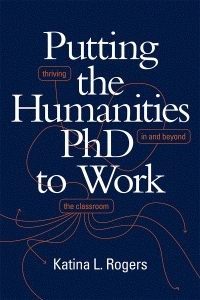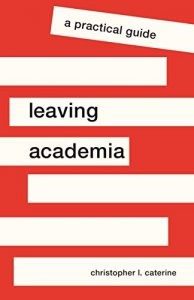In this double book review, Kristen Vogt Veggeberg and Eryk Walczak disrupt the notion that the humanities aren’t transferable outside academia. Putting the Humanities PhD to Work: Thriving in and Beyond the Classroom by Katina Rogers and Leaving Academia: A Practical Guide by Christopher L. Caterine offer humanities graduates a number of career pathways and alternatives post-academia.
In Putting the Humanities PhD to Work: Thriving in and Beyond the Classroom, Katina L. Rogers draws on personal experience, resources, and interviews to offer a refreshing look at potential career pathways for humanities graduates to explore in and beyond the academy.
Review by Kristen Vogt Veggeberg

It is no secret that, as of the beginning of 2021, permanent, full-time, academic positions within the humanities are becoming few and far between. This is especially so in the wake of COVID-19, where the subsequent cancellation of many in-person classes and the strain on resources have caused multiple jobs in higher education (HE) to vanish. While some doctorates within subjects such as science or education can easily be applied in private-sector industries, such as in research or administration, doctorate holders in the humanities may find themselves in a career bind.
what can one really contribute to society after spending many years only studying Beowulf?
That is where Putting the Humanities PhD to Work comes in, offering both personal experience and a guide for those in the humanities. Written from a first-person perspective by the author and providing a review of resources and interviews, Katina L. Rogers’s book is a refreshing look at the subsequent pathways for academics within the humanities to explore when the traditional road to success within the academy has been upended.
Rogers is very quick to point out that the humanities have, in a way, ‘always been in crisis’ even when jobs were not as scarce in academia as they are today. Whether it is funding, administration (‘Do we really need more professors within this subject, when less people are majoring in it?’), the humanities are almost always the first to be cut or scrutinised by those who handle university finances. After all, what can one really contribute to society after spending many years only studying Beowulf? Do we need multiple scholars on post-modern French writing?
However, Rogers also mentions that many of the skills that would benefit an academic in the humanities would also make one an excellent professional in other settings as well. Throughout the book, Rogers states that humanities doctorates would be helpful in introducing many of the necessary skills otherwise lacking in modern office environments. From the innovation of ensuring improvements in the writing of memos and emails to efficient task management, Rogers lays out the different ways that graduate students might think of themselves in different careers, if and when the ivory tower with its current financial insecurity stops calling.
The idea that one works for what one is passionate about, rather than for money, is a challenge in the technology-ridden modern world ... both within and outside of an academic setting.
Perhaps most refreshing is that Rogers addresses the proverbial economic elephant in the room: the 2008 economic crisis and its effects on academics, including Rogers herself (19). Indeed, recognition of the socio-economic challenges within an academic environment is quickly dispatched: namely ‘the notion that one works “for love.”’ The idea that one works for what one is passionate about, rather than for money, is a challenge in the technology-ridden modern world, where working long hours and responding to emails on your phone at 2 am is considered a badge of honour, both within and outside of an academic setting.
This concept of working for love is mentioned as part of the issue present in current academic circles, to which almost all professionals can attest. But unlike the private sector professional, who can anticipate monetary rewards for their long hours through bonuses or vacations, academics are merely expected to undertake their work as reward for holding the job and the title itself. Rogers explains how working on a subject without worrying about the return on investment, is both a privilege and an excuse to abuse a new employee desperate to earn tenure.
the many ways in which graduate students have researched, presented, and worked help lay out multiple paths that they can take on the road away from the ivory tower
Acknowledging abuse of an academic’s time and financial situation is not the only uncomfortable issue that Rogers addresses in the humanities. Rogers mentions the issues with systemic racism, diversity and inclusion movements within graduate school, and how these often relegate minority students to taking on additional roles that they receive either little training or little support to carry out. This approach makes this book best suited for three categories of readers: graduate students within the humanities, professors within the humanities, and administrators who must work with both respective parties.
The book is especially useful as it illuminates the many ways in which graduate students have researched, presented, and worked helping lay out multiple paths that lead away from the ivory tower. From becoming digital mavens in presenting their research, to navigating different technologies for teaching (a skill especially in demand during shelter in-place orders), many of the skills that academics hone during their time as doctoral students can be quickly transferred to paid positions outside academia. But this book does something special – it empowers, if not emboldens, the humanities doctorate, and encourages them to see the world in a way that is deserving of their time and hard work.
Note: A version of this post first appeared on 15 January, 2021 on the LSE Review of Books and we are grateful for their permission to reproduce it here.
In this Covid-19 period, which has worsened academic career prospects, Christopher L. Caterine’s Leaving Academia: A Practical Guide, provides practical advice for those considering a career change, especially those in the humanities.
Review by Eryk Walczak

Leaving academia can be hard for people who have never held a position outside of the university system and who have planned to spend their lives working as professors. Caterine was in this position himself and takes readers on a journey which traces his mistakes, learning processes and, eventually, how he found solutions. this book is a great read for both early-stage PhD students who might want to prepare a Plan B, and more seasoned academics considering working in non-academic roles. The author frames the process of leaving academia around the six Ds: dread, discern, discover, decipher, develop, and deploy. Each chapter provides a large dose of the author’s introspections which might seem familiar to others preparing for a career change.
The first feeling, dread, is probably common as the unknown awaits. Caterine suggests undertaking a realistic assessment of the pros and cons of staying in academia. He starts by dissecting his own motivations. Was pursuing the academic dream job really the best option available, or was he struck by a sunk cost fallacy which made him persevere because of the already invested resources? In this case, the epiphany came when Caterine’s wife was offered a permanent position at a peripheral US college. Facing a dilemma common to academic couples, a two-body problem, where the difficulty of finding an academic position is compounded by the need of a significant other to do the same, Caterine decided to jump ship. Thus he embarked on a mission to learn about the workings of the non-academic world.
… there is no such thing as an “alt-ac” career: academia is the alternative path
The author discerns the thinking patterns which held him back from leaving, and how he had to think about himself from a new perspective to find a position outside of academia. He guides us through his self-discovery and provides tips which worked for him. Many pages are devoted to discovering potential options, mostly through informational interviews and networking. Informational interviews are an approach that involves reaching out to unknown people to find out about their work. Once a rapport with the interviewee was established, supposedly simpler than expected, the author would ask for an introduction to another person when the interview was finished. Although networking might still be a dirty word for some academics, Caterine explains that it is crucial for finding out about potential opportunities in the unknown world of businesses, non-profits or the wider public sector. Additionally, conducting these conversations served a purpose of preparing for the actual job interviews.
The book does not provide much information about defecting from fields which allow a wider range of exit options: for example, computer science or economics. Researchers in these fields are likely to find it easier to switch to non-academic roles which might resemble academia. So-called alternative academic (alt-ac) positions might be available in technology companies or governmental departments.
The book can feel rather US-centric, even though many developments in academic employment described in the book can also be observed in Europe. Junior academics in many European countries are offered more secure employment than their equivalents in the US, but a wide variety of academic job markets exists.
Not all PhDs are seen as equal by employers, but the prestige of universities is glossed over in the book. Research shows that obtaining a PhD from a highly reputable institution leads to better chances of landing an academic position. There is a hint in the book that leaving a research-intensive institution might lead to more promising careers in the private sector as well. I wish that more hard numbers were provided, but the author’s take is rather qualitative, based on interviews with a number of ex-academics. This approach might suit some readers, but I would prefer to see the data about the state of the academic job market and the alternatives.
Caterine writes that his process of searching for a non-academic job made him realise the peculiarities of academia, especially the working conditions that would not be acceptable in a non-academic professional context. Caterine’s passion for the issues faced by the precarious faculty is evident on the pages of this book. Before leaving academia, the author was also a representative of a contingent faculty. He offers unorthodox advice on quitting an academic job even mid-term if an outside option appears, believing that this is the only way to improve the working conditions of the academic precariat. Short-term contracts and low salaries of the junior faculty seem to have finally been noticed, even outside of academia.
PhD students possess skills that are already valued outside of academia but these need to be packaged correctly
Caterine explains how PhD students possess skills that are already valued outside of academia but these need to be packaged correctly. Pursuing a PhD should provide a preparation for careers involving writing, presenting or project management. These are skills highly valued in non-academic settings, but they should be presented as such by adjusting the format of the CV or cover letters.
This brief book is aimed at everyone considering leaving academia, but I think that those in the humanities might benefit the most from it, given the similarity of potential career options and shared background with the author. This book should be an eye-opener for junior researchers and PhD students alike, and I would recommend reading it early in graduate school. Leaving Academia can prepare its readers for a potential career change at a later stage.
Note: A version of this post first appeared on 14 January, 2021 on the the LSE Review of Books and we are grateful for their permission to reproduce it here.
_______________________________________________________________________________________________
This post is opinion-based and does not reflect the views of the London School of Economics and Political Science or any of its constituent departments and divisions.
_______________________________________________________________________________________________





